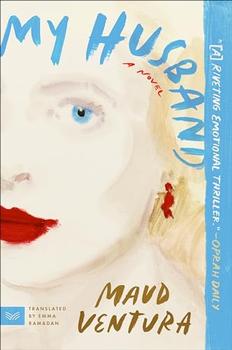Summary | Excerpt | Reviews | Beyond the Book | Readalikes | Genres & Themes | Author Bio

A Novel
by Maud Ventura, Emma RamadanExcerpt
My Husband
We moved into this house a few months before I began working as a translator. A colleague from the high school asked me to do a translation of a text for him that he couldn't finish in time—a popular science book on the Copernican Revolution. It was not my area of expertise—I knew very little about the historical period—but I accepted. Since then, the editor has sent me numerous translation projects: stories, a poetry collection, a crime novel that sold fairly well, books on the history of science. Right now, I'm tackling the debut novel of a successful young Irish author. It's not particularly difficult to translate, but the title still escapes me: Waiting for the Day to Come ... En attendant que le jour arrive? Dans l'attente du jour à venir? It resists translation. I can't manage to re-create its poetry, nor capture the concrete meaning. The heroine is not only awaiting the arrival of a new age, of a shift in mentalities. She is also waiting for the literal sun to rise. She must traverse the night and hang on until dawn. Only the first rays of sunlight will secure her salvation. Also, there's an impatience to it that I can't manage to render—an imminence, even. When you read it, it's clear that the day is just about to arrive. Waiting for the Day to Come ... And what to do about the ellipsis?
The rest of the novel hasn't posed any major difficulties. I went about it as usual. I began by familiarizing myself with the structure of the author's thinking. I learned the expressions she prefers, the ways she likes to begin her sentences, the repetitions she can't manage to suppress, her favorite turns of phrase. I entered into her mind and adopted her logic until the mechanics of the whole were revealed to me. After several months of work, I can now say that I have appropriated her expressions and can write in her voice.
At this stage I can savor all the subtleties of her language, which is not very technical, but quite emotive. English is simplistic: no declensions to memorize, no adjective agreement. However, it's a hilly language, irregular and changing: a rudimentary grammar, but expressions that sound good to the ear and an accent impossible to imitate. You can eliminate the syntax errors, expand your vocabulary, adopt the tics of the language, but English will always have a leg up on you. Sometimes I ask myself why I didn't choose a logical, predictable language like German. With English I have to give up all control, which often irritates or frustrates me, but maybe it also explains why I haven't grown tired of it.
People have asked me if my work as a translator has made me want to write my own things. My response has always been the same: I don't think of myself as an author. When I translate, I am merely an interpreter, and that suits me perfectly. I don't have to invent anything, which works out well because I don't have much imagination. I prefer to observe, analyze, deduce; to dissect a text, discover its underlying meanings, uncover its implicit tone—to be on the lookout, like an investigator on the hunt for hidden clues. I also often think back to Marguerite Duras: "I've never written, though I thought I wrote." The second clause in my favorite quotation has always carried that warning: be careful, you're not writing, you're translating.
*
The smell of the rain-soaked lawn reaches my window. I wish it would never stop raining. My husband is at the office, the children at school; I can continue my work without being disturbed. When my husband is at home, I lose all ability to concentrate. I jump at the slightest sound in the stairwell. As soon as I hear him approaching, I take off my glasses and turn off my computer. I would always prefer that he find me plunged into a thick linguistics textbook or absorbed by the translation of an obscure Byron poem than filling out my students' report cards on the school website. As a precaution, I always have a fountain pen next to me in case my husband enters my office: he loves to see me writing by hand.
Excerpted from My Husband by Maud Ventura and Emma Ramadan. Copyright © 2023 by Maud Ventura and Emma Ramadan. Excerpted by permission of HarperVia. All rights reserved. No part of this excerpt may be reproduced or reprinted without permission in writing from the publisher.
The secret of freedom lies in educating people, whereas the secret of tyranny is in keeping them ignorant
Click Here to find out who said this, as well as discovering other famous literary quotes!
Your guide toexceptional books
BookBrowse seeks out and recommends the best in contemporary fiction and nonfiction—books that not only engage and entertain but also deepen our understanding of ourselves and the world around us.